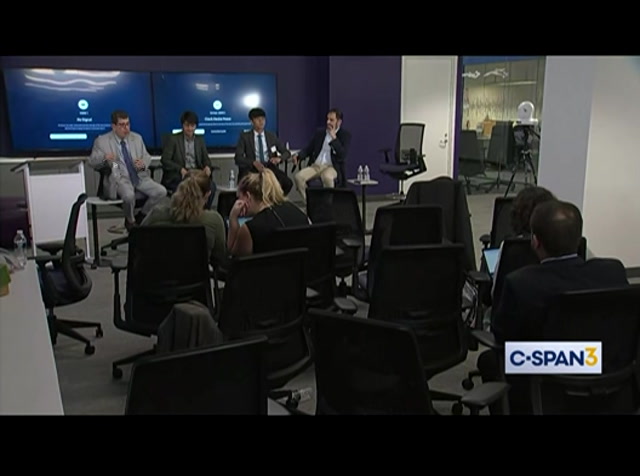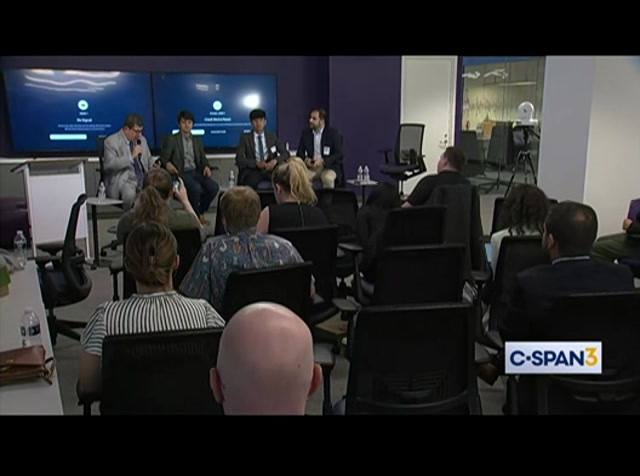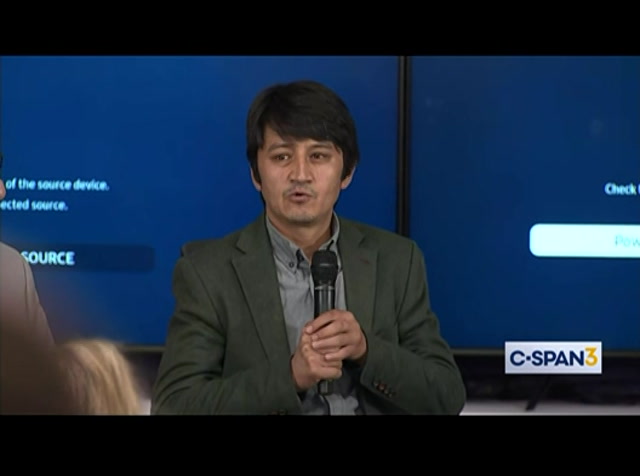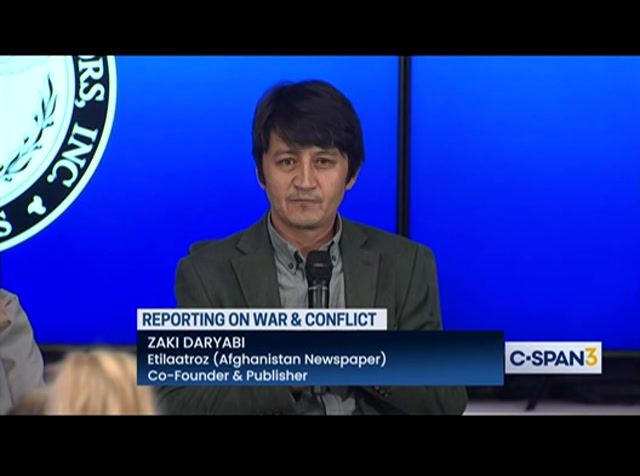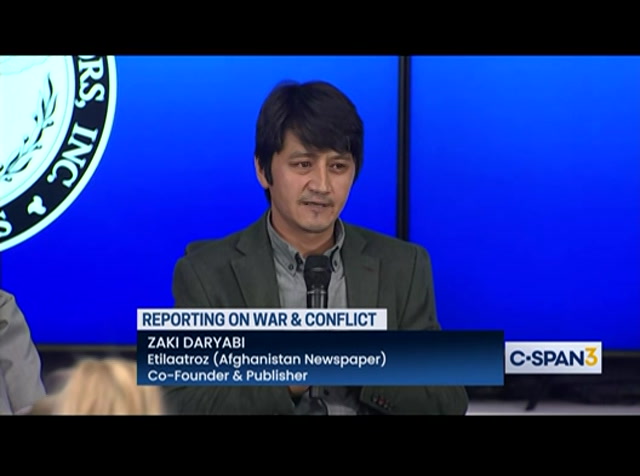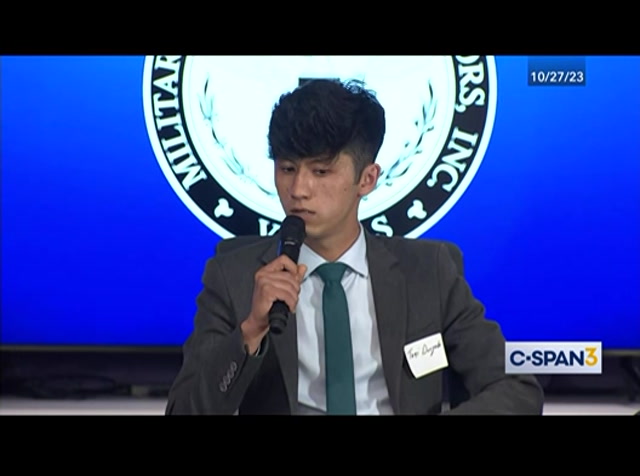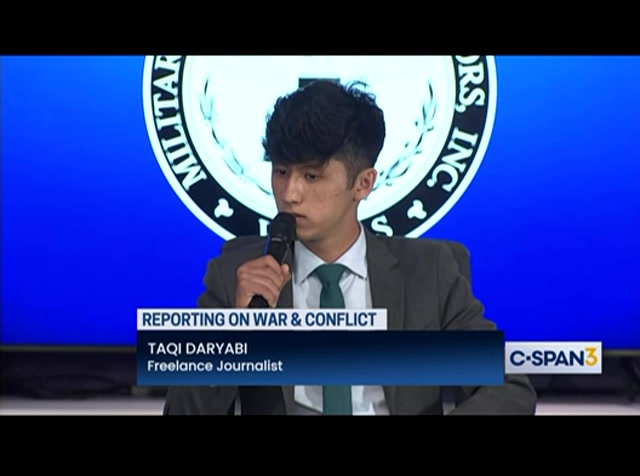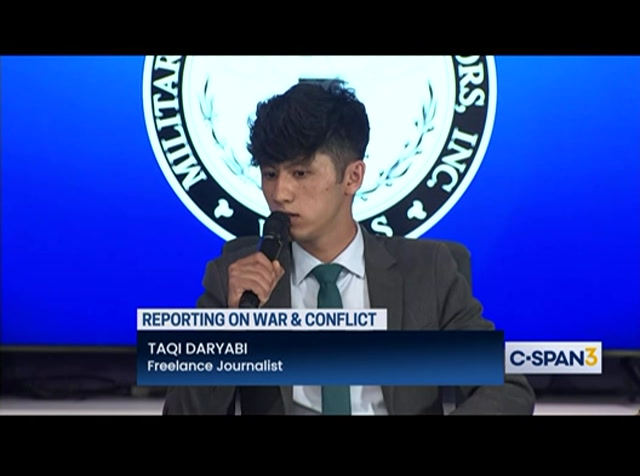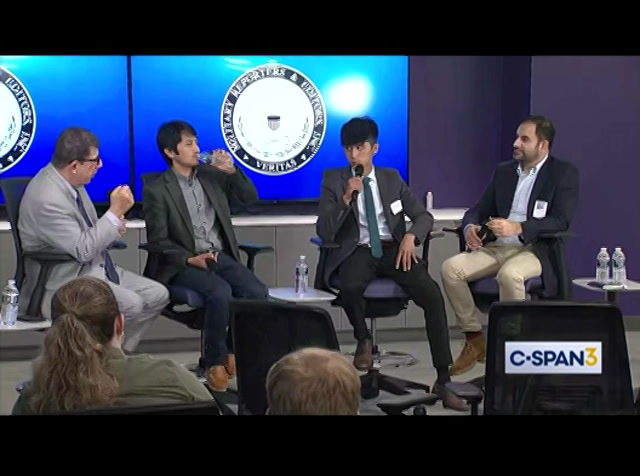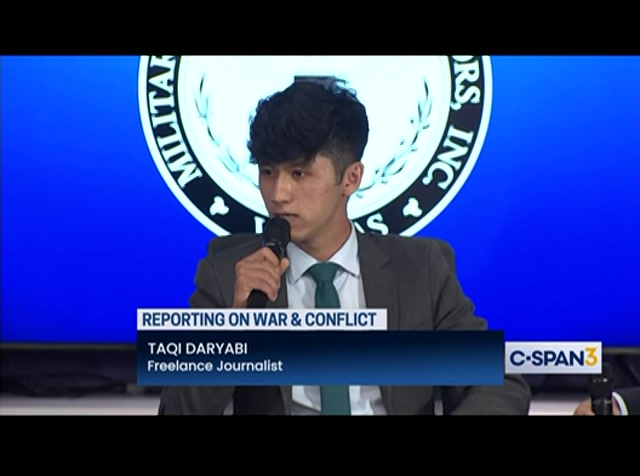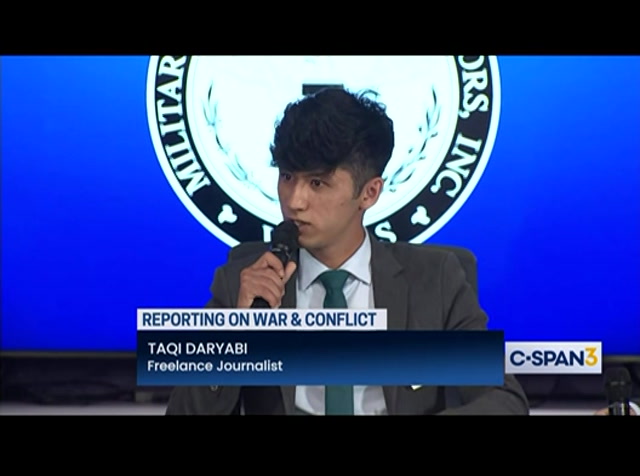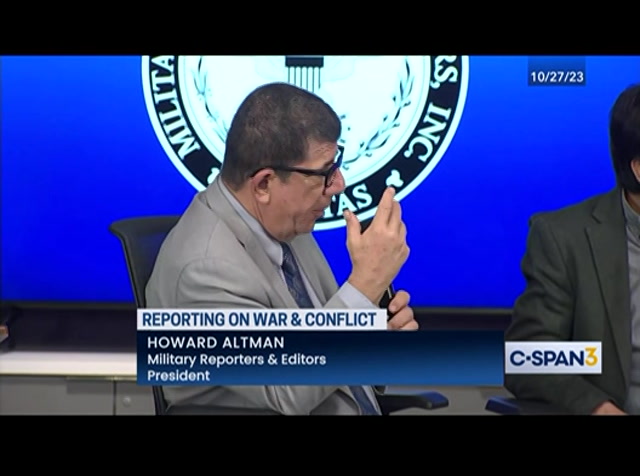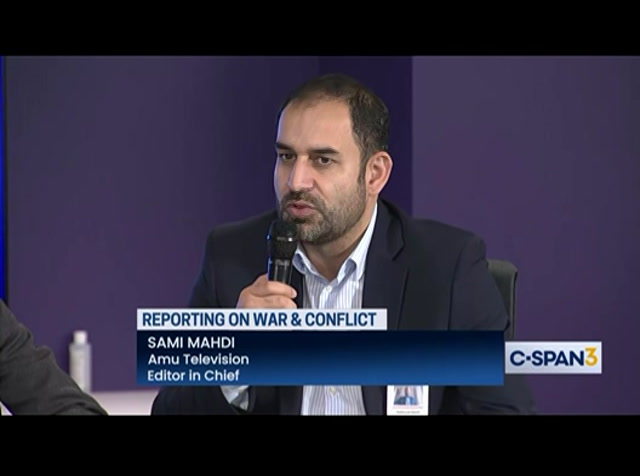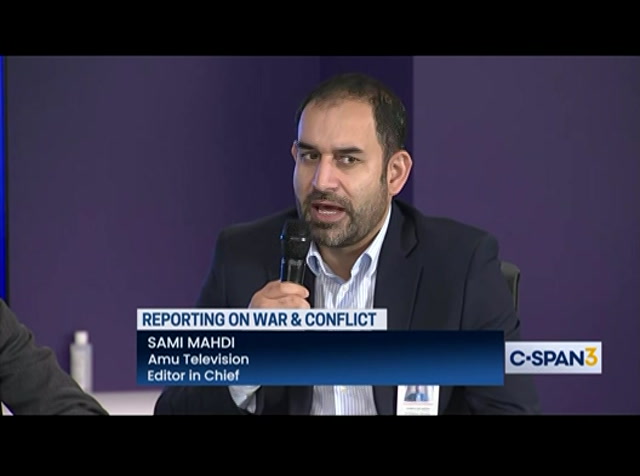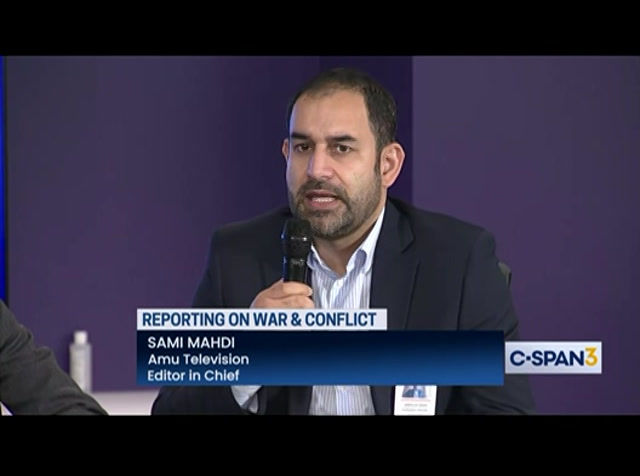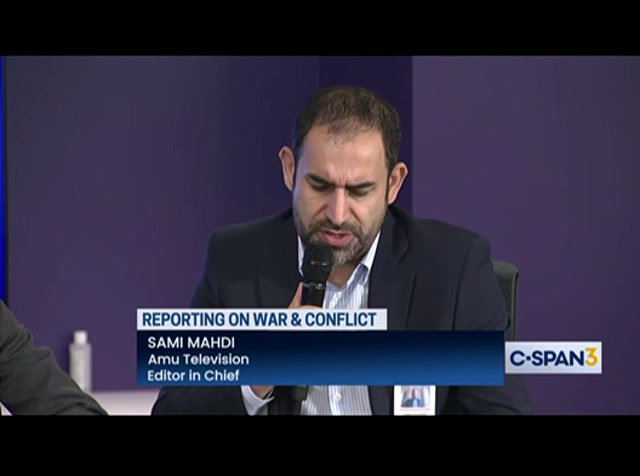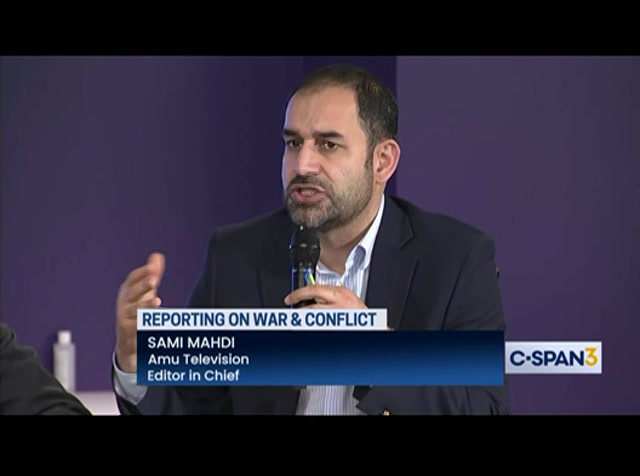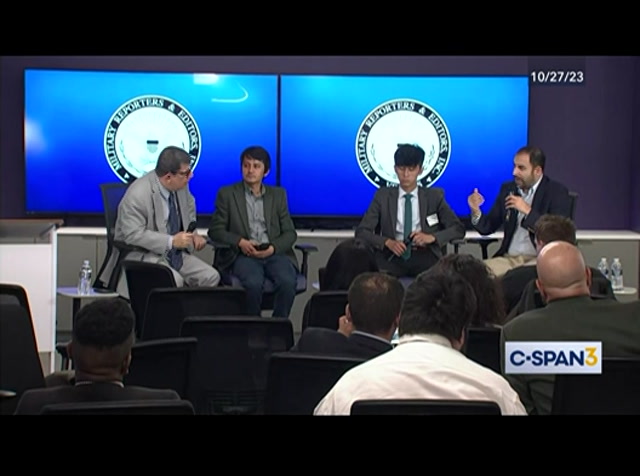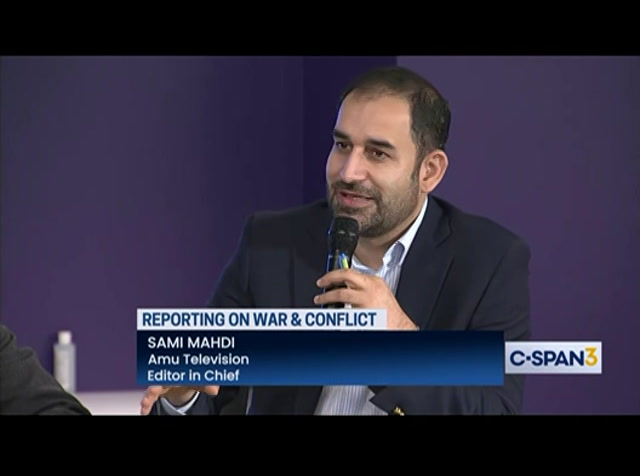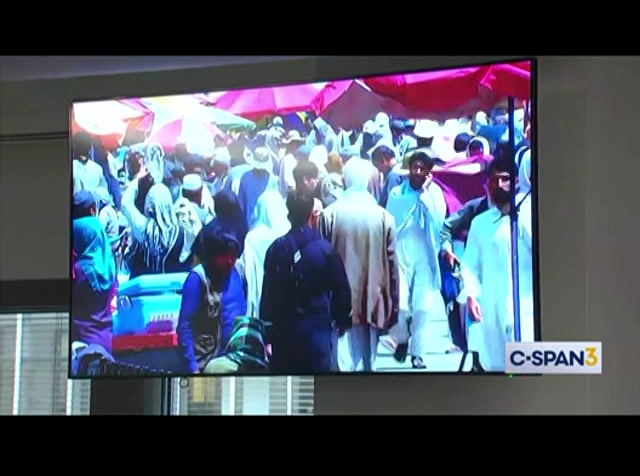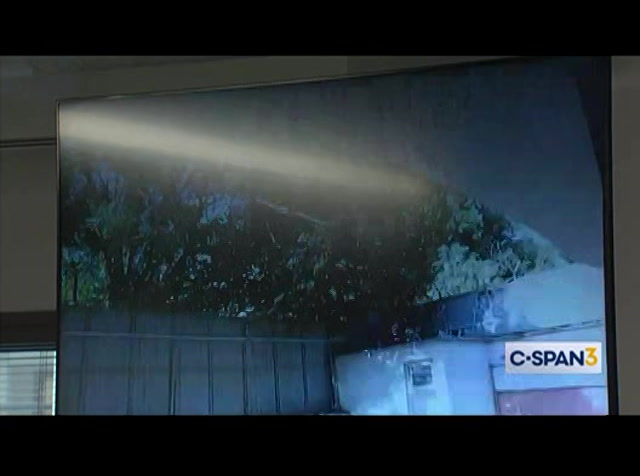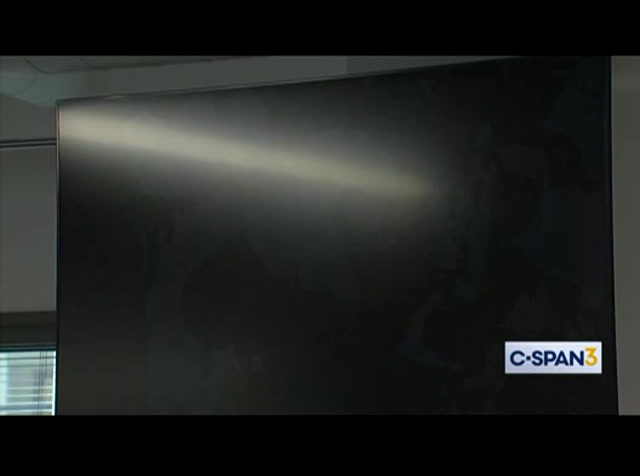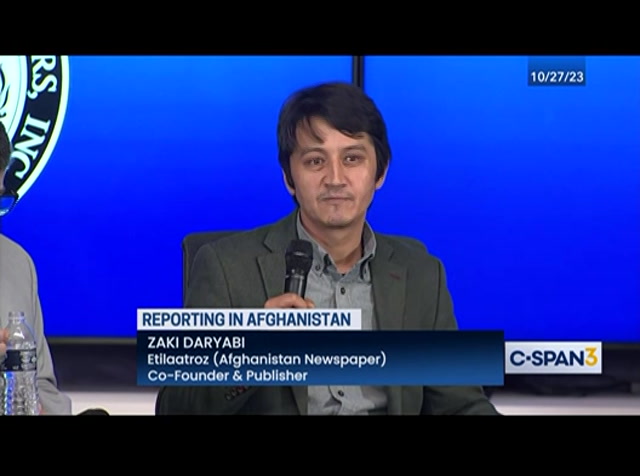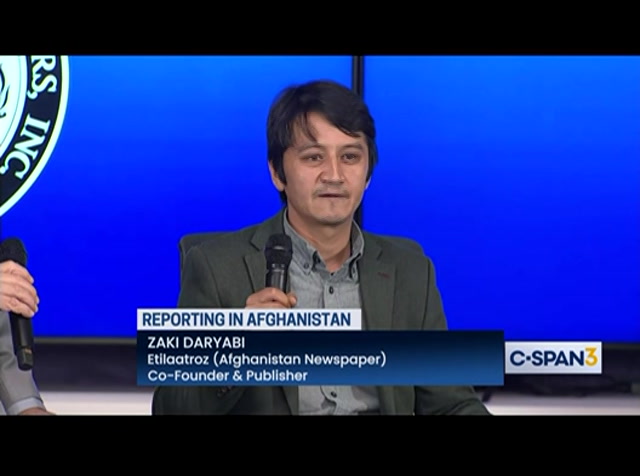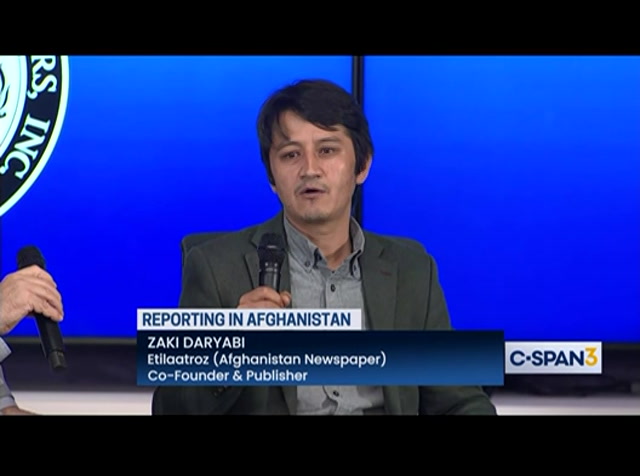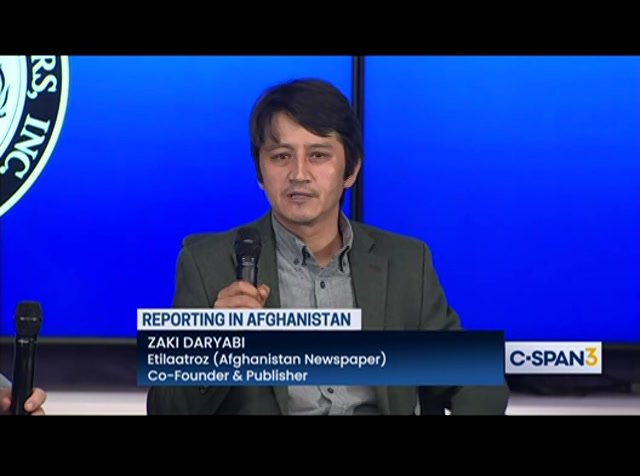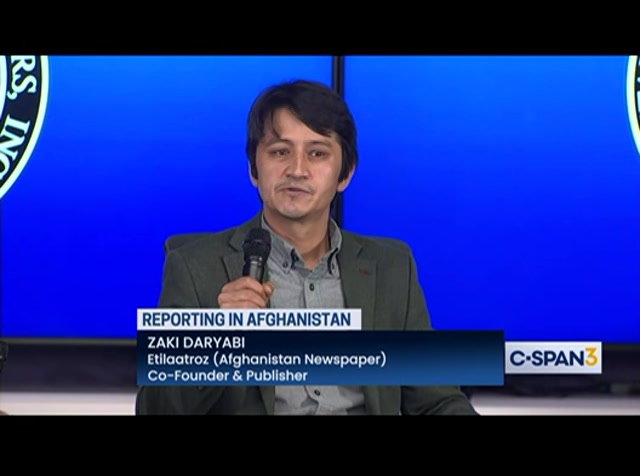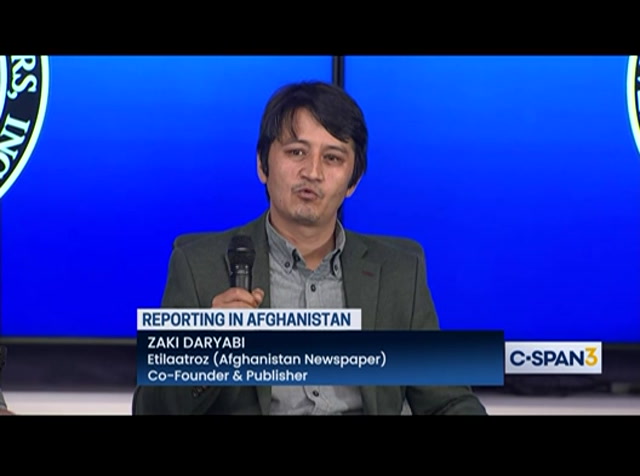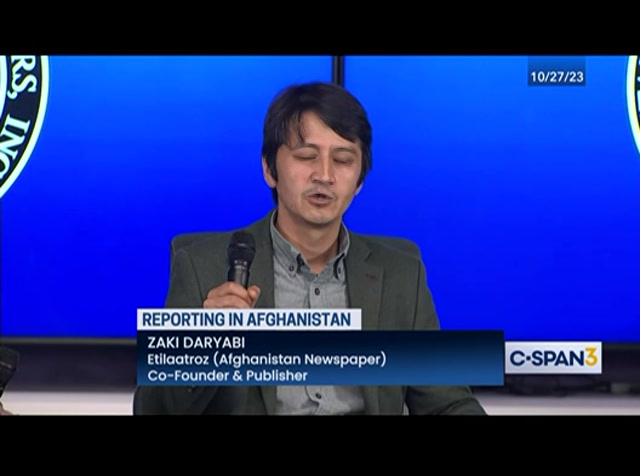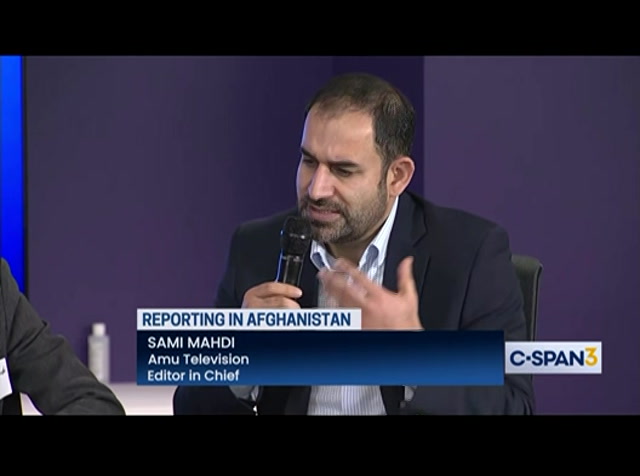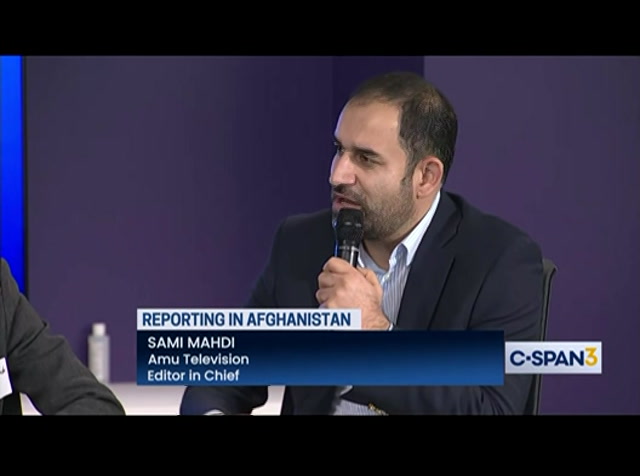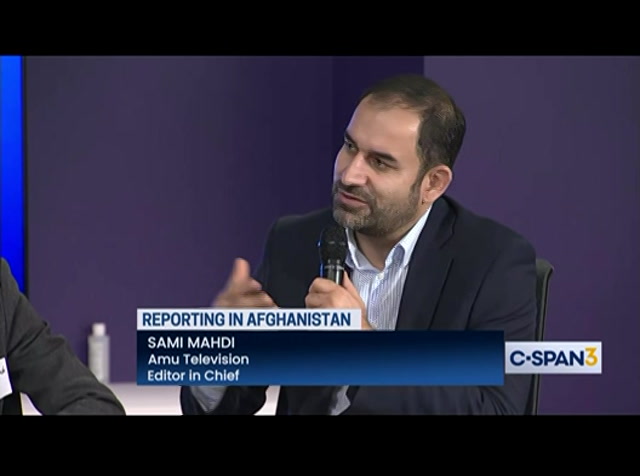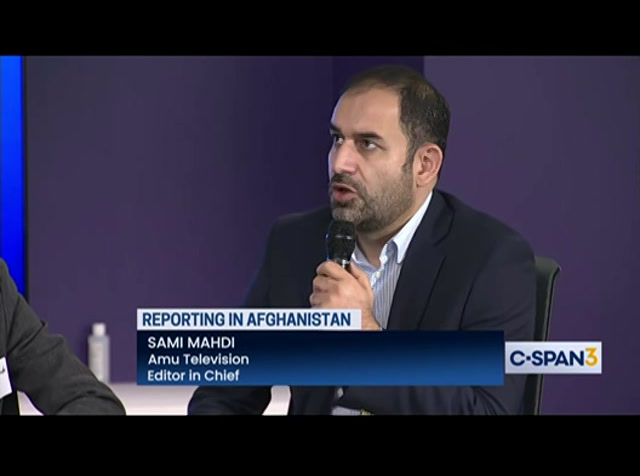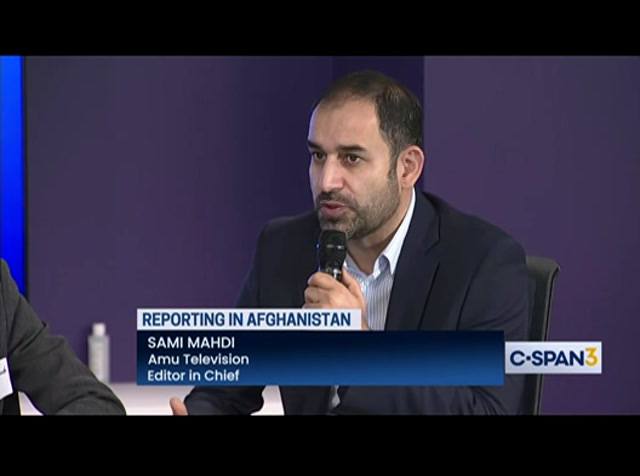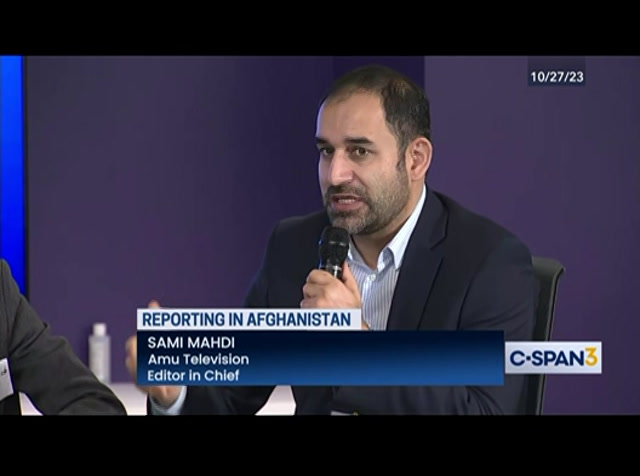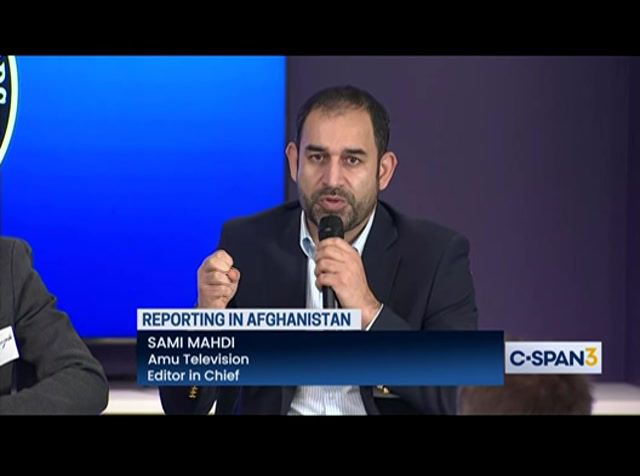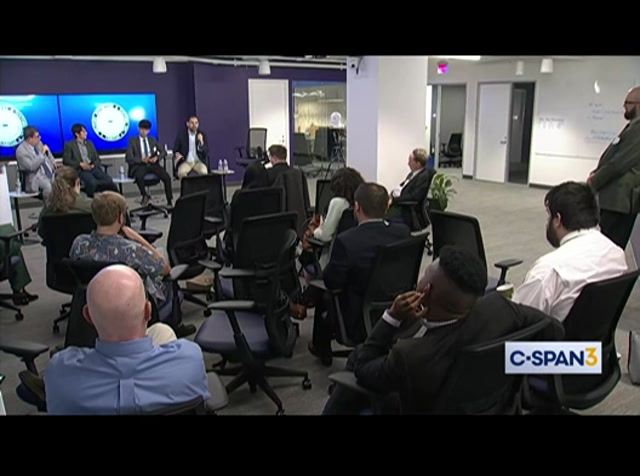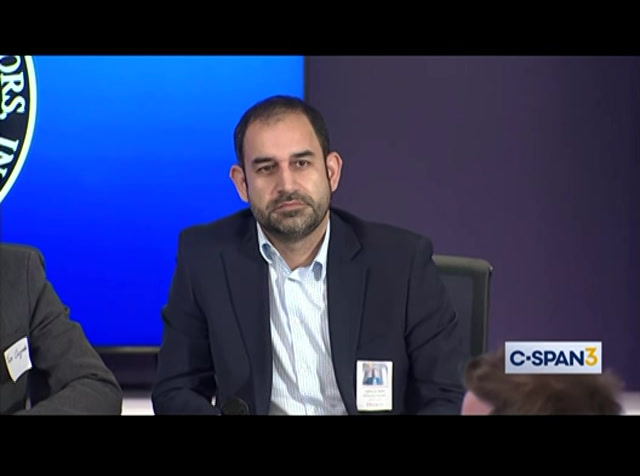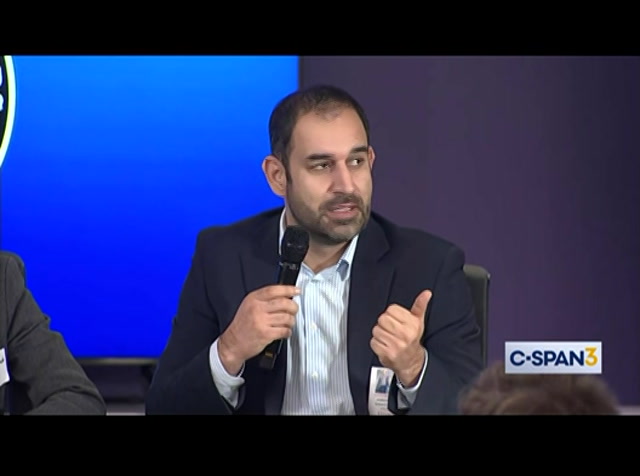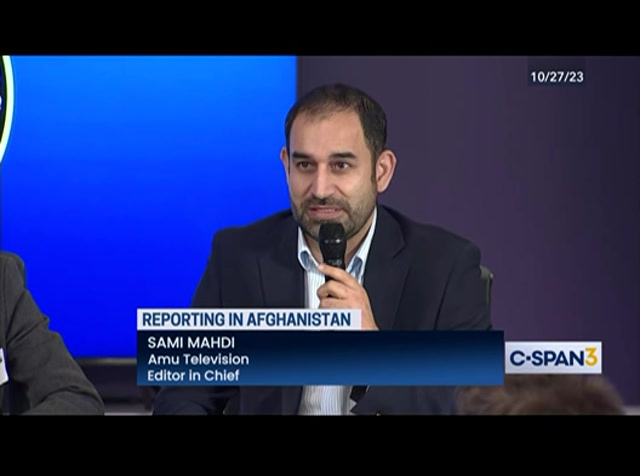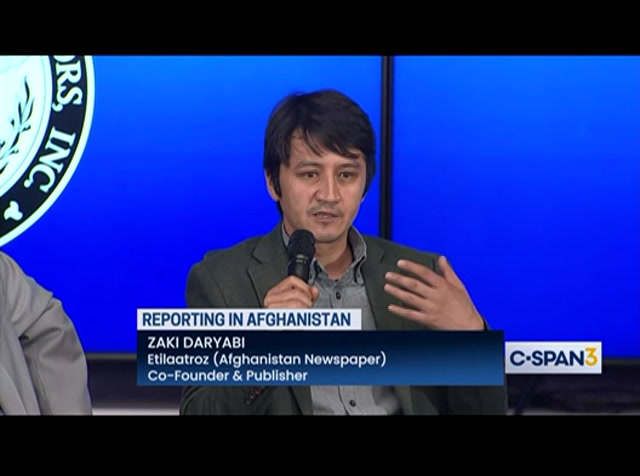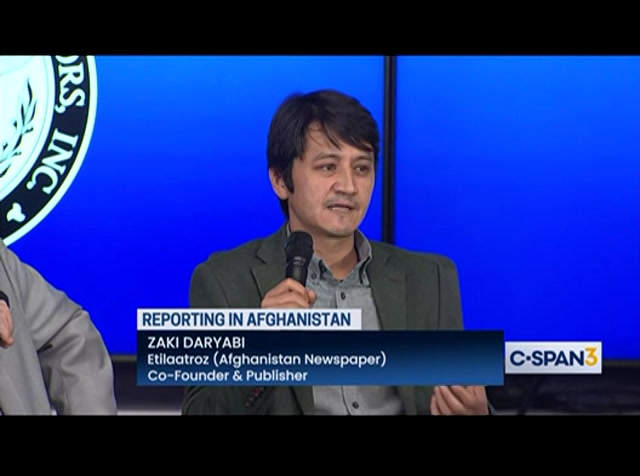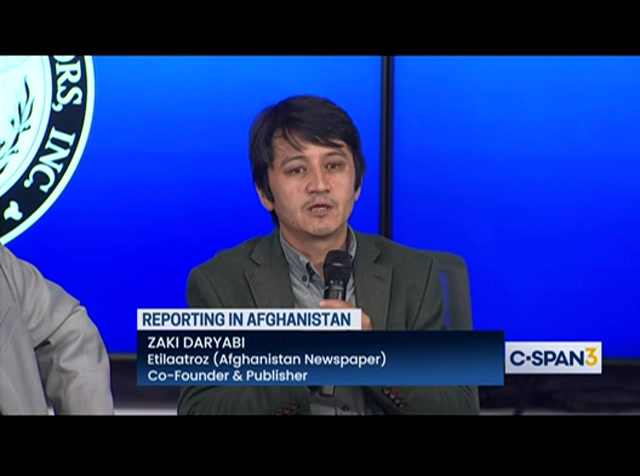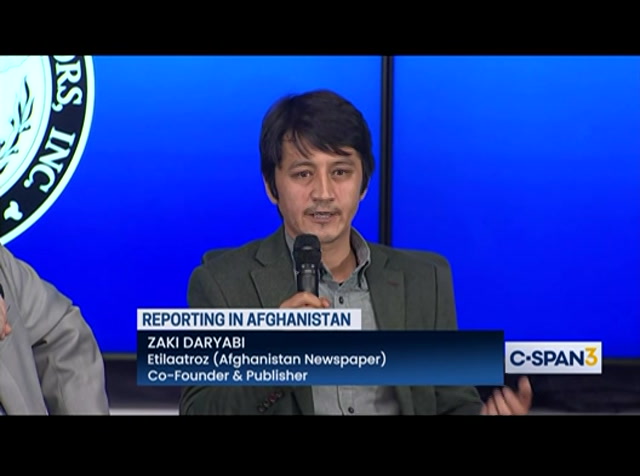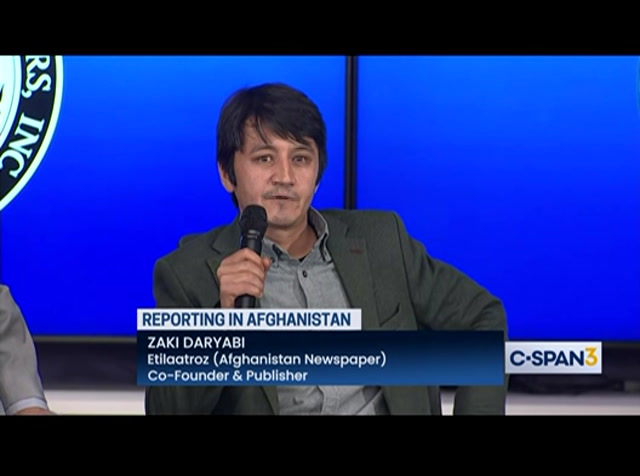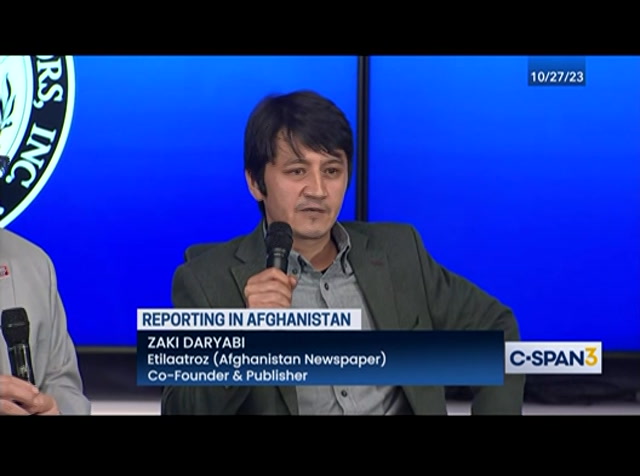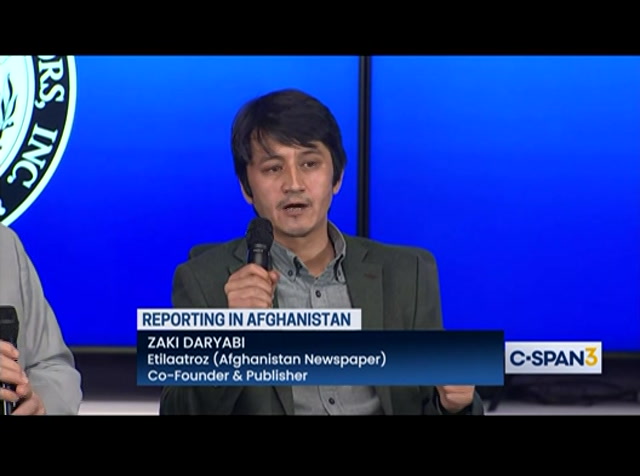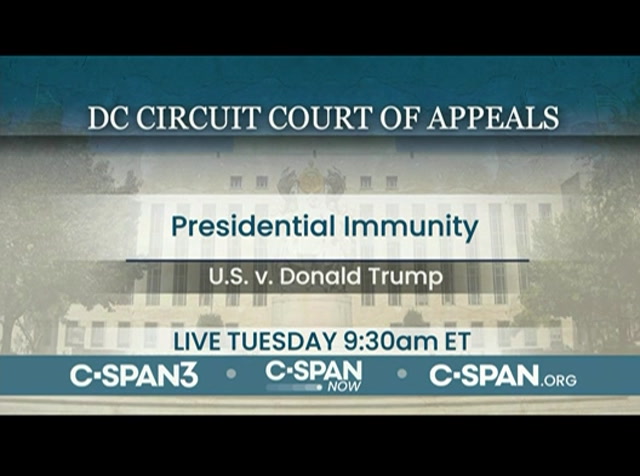tv Afghan Journalists on Freedom of Press in Afghanistan CSPAN January 8, 2024 8:01am-8:51am EST
8:02 am
8:03 am
newspaper el triatos. next to him as his brother, a freelance filmmalker and -- filmmaker and video editor. these are afghans living in the u.s. and covering afghanistan, everything what's going on there. let's talk about some of the challenges you face covering afghanistan with the taliban in charge? >> good afternoon. i am very happy, thank you for hosting this panel. i think a challenge and afghanistan to the media have a long history, when we started in afghanistan after 2021, there were many challenges.
8:04 am
it was not supportive for artists and media in afghanistan. there were powerful people who had a big problem with the independent media, especially artists who were following corruption, pulling the government to accountability. so in 2021, there were a lot of journalists -- and it continued when it -- when the taliban returns to kabul, the power. they had to stop their work and thousands of people across the country fled the country, and now they are living around the
8:05 am
world, in pakistan, iran, and this is what happened after the taliban. i was there when the taliban came to kabul, i was there until october. we were covering protests from the women, but the taliban took five of my colleagues, including --, and [inaudible] it seems like it increases day by day, working with the independent media, the exiled media. they are denouncing in many provinces and in some ways working with other independent media is now a crime.
8:06 am
when you announce this, there isfor you to be an independent journalist -- is no space for you to be an independent journalist and said -- inside the country. journalists are still working with us, but anonymously, without their names, and they're trying to keep the flow of information alive from afghanistan. if we go into details, there are a lot of challenges we can describe as well. >> do you want to talk about what you experienced? >> i've talked a lot about that experience. when we are talking about challenges journalists and afghanistan have -- in afghanistan have, that is a
8:07 am
big challenge journalists in afghanistan have. i was tortured for a few hours in a prison, but i am not the last one. but now that i am talking about that moment, my heart is beating -- i should think about that moment -- remembering those few hours that i spent with the taliban is not easy for me. sinc -- so, talking about my experience -- not only mine, but my colleague who is not here -- he is in pennsylvania. i wish he could be here, but he is not. all the journalists after us, it is not easy. i don't want to talk about it
8:08 am
anymore, but what we experienced in the prison, i am sure all of you have read our stories. if not all of you, most of you. let's talk about the future. let's talk about what afghan media is facing currently, especially in the independent media. and the other media that is so active and reporting from inside of afghanistan. even if we have journalists in prison, even if we have journalists being tortured, let's talk about the challenges that are more important -- i know it is important that journalists are imprisoned. we should come sit -- considerate -- consider it an important
8:09 am
challenge afghanistan people have. it happens to me. i wish it didn't happen to me, but it happened. it's not going to make me like, i don't want to continue working, i don't want to continue being a journalist. i still continue as a journalist, making documentaries about what's going on inside afghanistan and what is happening to the people. we are not going to stop being independent journalists, and we are not going to end the freedom of expression in afghanistan by this kind of experiences. why are -- we are not going to give up. >> let's talk about the future for a minute.
8:10 am
what is it you would like to be able to, a story you would like to be able to tell? taqi: when you're a journalist, there is not a specific story that you're willing to tell everybody. there are a lot of stories and afghanistan -- in afghanistan. if you think about the current situation in afghanistan, always see is poverty, always he is the -- all we see is the taliban, who is trying to kill the freedom of expression in afghanistan, and the people who are suffering under this situation. our job is to tell the story of these people. and for the future -- if i am
8:11 am
talking about my plans, right now, currently,, and trying to learn more of what i learned in the past few years. i was working with -- until the last day of june in this year, and now i am working at a private club in washington, d.c. to take a break for a few months, maybe one or two years, and then i want to focus on my education. but i will be back and be back with a strong and better idea about afghanistan, about the freedom of expression and about journalists in afghanistan. talking about the media, fair dealing with their colleagues,
8:12 am
they still continue working. that is what i am planning to do for the next few months to the next few years, but we can talk about it maybe once i get to the position i want. >> we talked earlier about the challenges of running on operation in the united states, trying to fund and also tell stories about what the taliban are doing in afghanistan, about the poverty and oppression. talk about some of that. zaki: thank you so much. can you hear me? thank you so much for this opportunity, and i appreciate that a group of professional journalists and media editors are here and still talking about afghanistan, something in the
8:13 am
international media. let me give you a bit of what is happening right now in afghanistan in regards to media and freedom of expression. you know, we had one of the freest media environments in our region. in the past 20 years. of course, thanks to the international community support and also the long-standing struggle of our people inside the country, who struggled for freedom and their rights, and basic human rights. we had one of the freest media rights in the community, 100 tv channels, hundreds of newspapers, publications and tv
8:14 am
stations. from the beginning, the taliban were against media and freedom of expression, of course. if you remember during the 1990's, they banned all forms of video, pictures in the country. watching the tv was for bidden by the taliban during that time. during that time, we lost more than 100 lives from the media community. more than 100 journalists were killed inside afghanistan and most of them were killed by the taliban, and the taliban took responsibility for their killings, proudly, including some of my colleagues when i was working for a local television station. in 2016, they bombed one of our vehicles and killed seven people together, injured 15 more. when i was working for radio
8:15 am
liberty, the branch in afghanistan, they took some other colleagues of ours, including our colleague in the southern provinces. this wave of terror from the taliban's side against media, freedom of expression, and civil society existed in the past 20 years. it is not new. but since they came to power two years ago, in 2021, they now control the power in the country. one of the very first things they did was to abolish any kind of, any form of music and entertainment from tv and media. then, they removed all female presenters from our national radio and tv networks. then, they ordered all private
8:16 am
channels to put these masks to conceal the faces of women, female presenters on-air. now they are controlling editorial policies of media inside the country. that is the situation. i will give you some numbers -- over 264 media outlets were closed down in the past two years by the taliban. reporters without borders, 43% of the outlets have disappeared. they also report from over 10,000 journalists inside the country, we now only have 4360, something like that. 2400 90 female journalists inside the country, but we now have only 410 remaining,
8:17 am
reporting still from the country. this situation, unfortunately, has implemented a kind of censorship on media. they have been manipulating the data, facts and information. for example, yesterday there was an attack on a sheer -- a shiite community, a sports gym, and the taliban reported only four people were killed. but the local sources say it was much more, you know? many other people were killed. last week, there was an attack on a shiite mosque in northeastern afghanistan, and the taliban reported only four
8:18 am
people were killed. in fact, more than 90 people were killed. this forces local media to distribute and publish the kind of numbers and data that they approve of. but now, where thousands of miles away from home. it has been very challenging to report on afghanistan because we don't have access to the ground. the kind of reporting we used to do in afghanistan does not resist anymore, it has been criminalized inside the country. for example, my colleagues were arrested by the taliban. they arrested nine of my colleagues and kept them for six months without giving any explanation why they were
8:19 am
arrested, what kind of crime they had committed. nothing. then they were released and they arrested five other colleagues from different provinces. they were tortured, kept in individual cells for over a month and then released without any explanation. you are not allowed, as zaki said, to work with international media or media outlets based in a foreign country. >> we have a video ready, do you want to -- do we want to run those?
8:20 am
>> before the taliban returned to power in 2021, afghanistan was an example for free press and the region. not only did the taliban change this immediately, they banned music, forced female presenters to wear masks their faces, and band media content and censored access to information online. 40 million afghans became accustomed to high quality media content over the past decade, and in an instant, it was taken away. in response, we present you with tomo tv. launched on world press freedom day, this was maine with the first -- made with the first satellite-tv panel for afghanistan, coupled with dozens of colleagues on the ground in
8:21 am
afghanistan to produce independent news, hard-hitting interviews and to give a voice to the voiceless. we celebrate afghanistan's culture and entertain audiences by producing and broadcasting diverse content that reaches over 19 million people in afghanistan, with reach to afghans in iran, pakistan, and asia by satellite. our ray of hope is home to over 50 content producers in the u.s., turkey and afghanistan. >> let's now run taqi's video.
8:24 am
dealt with the fall of kabul. we were planning to make a documentary about 20 years since the 9/11 attack, because there were journalists who had come from the u.s. and around the world to cover that, because it was the last year we were supposed to be in afghanistan. we agreed we would grow there, live there, study there, become journalists. but the fall of kabul, the fall of afghanistan happened really fast. august 16, i was with my colleagues and two of them said, you can grow. you can stay with family if you want to be here after the war. then we looked -- this
8:25 am
documentary is a 90 minute documentary, private screenings, and this documentary is -- so many awards. this is a trailer, and the whole documentary shows how there was [cheers and applause] -- there was [inaudible] the fall of kabul, we can show to the world beyond the reach of the taliban politicians, what is happening with afghanistan. i think this documentary is talking about hope and prayer to
8:26 am
those in hopelessness and also, people in the new generation feel like they are alone. and then, they feel like their value has to be inside. you see a lot of journalists inside the newsroom, they are trying to, and cover what is happening. when the taliban is in the city and they are trying to ban everything, how they want this challenge to continue, reporting from afghanistan.
8:27 am
-- how the taliban looks, what was their reaction against us, and the reaction against other colleagues. one and they had a document terry about the government. they are in prison for 20 years. and then his future with his life, it is not just about him, there are children and women in the prison. and they are persecuting them and nobody is talking about them. this is kind of drawing a map about when we work under the
8:28 am
taliban, it shows how the taliban is in afghanistan and women in society and things about that. host: when you are neutral, how surprised were you when the taliban took over? about how quickly that happen. how did that affect your ability to cover things in the future? guest: on that one there were a few big responsibilities. there was with my team and then a few responsibilities. if anyone was asking -- it had the responsibility for the u.s. to achieve. you had to track the demand. but the audience, they would not report what was happening around the country.
8:29 am
we were like keeping an everyday demon from the people of hey this happened in the city. why are you not reporting? i sent you a lot of documents. and then everyone was asking if they would flee the country. they were demanding -- and then the second was really about -- if something bad is happening for you and your colleagues, and then you're thinking about your future where there is no -- what is the future of your wife and children and sister? so i think this was some kind of challenge like that one.
8:30 am
and while we try to push for help for our colleagues, i was in the office and i never stopped the work. and some of my colleagues -- kept the newsroom alive. we moved the root -- newsroom. in some of the colleagues in the country were at qatar, the military base and somewhere in pakistan. and so we had private media covering areas. and i was told to get my stuff and get out. i think it was very hard, but very valuable. you talk with people and you treat a lot of demons but you
8:31 am
still have hope. that you can help and you can keep it going with the mission on afghanistan. it was hard, but i think we did good. host: talk with me about amu. how many people were you able to reach in afghanistan covering it from afar. what is the reaction in the country from the audience? guest: after the fall we basically decided to forfeit our mission. the only way to do that was to establish funding from abroad because in fact the country was impossible for independent journalism to continue. so, i came here to the united states in 2021 of november, november 2021 and -- along with other colleagues.
8:32 am
and we had this idea of establishing news, a tv channel that could dive deep into afghanistan through backup of course. and when we say that, we mean small areas that are popular in afghanistan. people in villages in every part of the country have it and it is relatively cheap. it is like $20 you can get one. there's no more monthly fee. now we are on air 24/7. as i mentioned in the video we started our broadcast in a third world press freedom date. now all across the country people can watch us. so we get feedback from those in
8:33 am
the south and in the southwest. every corner of the country. we have news in both languages and we have political talk shows and also we have entertainment. music, and educational programs. we try to put more female faces on tv and taliban is not a very big fan. but basically we are trying to fill the vacuum, the gap that is there after the arrival of the taliban to power we are trying to give the people a sense of hope that the reality of afghanistan is not just about them. you live a different life and that reality still exist and we
8:34 am
try to get that back to the people. host: is there a pushback on the taliban or any prod -- broadcast. was anybody arrested or injured in any way by watching this broadcast? guest: i think they have blocked it on the website inside of the country. it is very difficult for people to access our website, but technically they do not have the technology to block the broadcast in the country. the iranian regime tried bad for over 40 years now, to block dings from those inside of iran but they have not succeeded. they do not have the means yet. and after -- going to people's homes and stop their shops and
8:35 am
restaurants from watching this tv channel, no they don't do that. the people have been punished for common things online. posting things on facebook or twitter for instagram. and we have both in the country and also tiktok. but facebook and twitter is there and youtube is there. we have leadership and youtube as well. the taliban have arrested 14 of our colleagues. they don't like us but i think they are getting to a point that they don't like the -- they have to respond because they know that they cannot have viewership and readership. they do not like us but still they give us sometimes interviews or answer our questions or when we are trying
8:36 am
to do reporting. the challenges of being reporting from abroad, publishing a tv channel or newsroom outside of your own country, while you don't have the same amount of resources and support from the market and from the people, it is very big. if these newsrooms do not exist taliban will control 100% the narrative of what is going on in public broadcast. they have been lying about the numbers of people being killed in isis attacks. they've been lying about the countries common. they've been lying about the tax reduction. they've been lying about almost everything. the only way to challenge them
8:37 am
is the independent voices which are publishing from abroad. host: i appreciate this. i want to open to the audience for questions. and then i have a past president of emory. let's get a mic for him. >> hello, i just wanted to pick up on the last lot which is given all that you and your colleagues have been through, what advice do you have two american journalists about how to challenge propaganda, disinformation, and lies and create a balance in a new cycle that is so dominated by misinformation and rumors. ? guest: if the question was for
8:38 am
me, i think american media is definitely much more experience spent us, but i would say do not follow what you see on social media. it is mostly misleading. mostly misleading and having people on the ground is, nothing, i think can replace people on the ground when you have sources on the ground, it's very important. if you are covering afghanistan, it is a very complicated country. i can say that two years ago the american media and western media were kind of dissolved in the taliban. they would give them a place like caliban to point to or this
8:39 am
is the new generation of the taliban. they are changed. they are reformed and they want to live a peaceful life with the international community. they will live -- they will let women go to school and work. in new york times for example the head of the iconic network was promising in that that they would give all the rights to women and when mom will be allowed to go for education and do their masters. that kind of reporting, that kind of opportunity for the head of the terrorist group without challenging it, or seeing in the interview with the same guy after that. without challenging the guy and praising the guy for having a
8:40 am
few female employees inside afghanistan. i think that kind of mentality, if i give, if i may give an of vice to american media, please avoid that because i think at some point, he is not understand their power. and that power kills people sometimes. host: next question. >> hello i have a question to you as a ukrainian, see how sometimes the western media here get a lot of things wrong about ukraine and russia. what is your -- does your media get wrong about afghanistan about -- after the television came to power?
8:41 am
thanks. guest: first of all, the reformed taliban was something badly gone wrong in western media. they thought this phenomena existed while it didn't. i think that was maybe part of the problem. i don't know. but when it existed we witnessed bat in western media, unfortunately. that was part of -- that have become part of the reality. and that impacted peoples morale in afghanistan. and another thing which has gone very badly wrong about afghanistan is the stability out of the taliban takeover.
8:42 am
they say that taliban have managed to have a better economy . well, we do not know the national budget. what is the national budget. how much are you spending where? there is no reporting. there is no sense of responsibility to our media or the public. ok. how are they spending this money. they have government employees paid by the international community. so these kind of misinformation's for distorted information about afghanistan exist a lot in media platforms. i hope they do more education about what really happened in afghanistan. >> i want to ask one more.
8:43 am
i think the biggest mistake in western community and media, with the taliban, was we had -- women's rights. it was them being able to go to a good school. this was the only wish that the international community had. in western media they pushed this narrative and talked about this. this i think was from the taliban side to make women's rights and the right -- but then they abused it to get more money , to push more pressure on the people. now you see people don't have the right to leave.
8:44 am
[indiscernible] without any accord without anything that has to do -- responsible for. and then the taliban took the rights they push you in prison because -- there are questions around this. and then we just talked about the women's rights and the belief that they could go to school. there was very simple and basic rights the people of afghanistan do not have right now. there are students and thousands of people in prison who were making a decision and they are torturing because of their ethnicity and belief. and if you go to afghanistan. someone is coming from the other side and taking your land and property and killing and no one
8:45 am
is talking about this. i think this basic thing that is happening everyday inside of the country pushed under the cover is -- independent right journalists push it in the corner and we are just talking about human rights coming back to your vision, -- one of the thing that may be international media can help in partnership with the media -- they have experience in afghanistan and they also have -- citizens that are with them in the ground. -- on the ground. i think they have the partnership and with the media. and one of the things that brings us resources.
8:46 am
and we talk about what is happening actually in afghanistan. this is one thing that really -- around the country have been executed for it. but i think with one experience it happened in the u.k.. -- they had some come out about the women in afghanistan. and it was a financial leverage. they had -- found out from afghanistan. and then they bring the news what is happening in the ground. and they are also reporting in afghanistan. host: anyone else? >> thank you for doing this. i am wondering what your sense
8:47 am
is about how people feel about the u.s. in general now that we have pulled out. i'm just curious how people feel about the u.s. at this white and if their desire for the western world to get involved again, i don't know, kind of a big question and it could be loaded. guest: we don't have an opinion, but i think in kabul there were two things. one, a lot of those in afghanistan felt like -- betrayed by that. by the people in the government. they were thinking that we fight for somebody and then they were feeling like the taliban return was -- they were looking at it in qatar and there was no
8:48 am
guarantee for basic rights. and the other side it was another opposition narrative that everyone was taking like no. it is the product of our government they been supporting the afghanistan people for two decades. and then there was this corruption. and the afghanistan people -- they were thinking about -- [indiscernible] but they came to afghanistan to collect money and power. leaving vip in prison and bring a lot of money here. this is one of the things i think everyone was thinking about with the options. now, i think the telemedicine
8:49 am
are blocking the narrative about -- they are pushing islamic agenda in a radical narrative about islam and they are pushing to see everyone who is kind of -- to go with the people. they are against it, they are not muslim. i think it will change in the next year if he do not have an efficient -- in western schools. and these people that think differently and see the reality and not would be limited if they want to push it. host: i'm sorry i need to cut it off. but i appreciate it. thank you for coming out. and next up we have gerald
12 Views
IN COLLECTIONS
CSPAN3 Television Archive
Television Archive  Television Archive News Search Service
Television Archive News Search Service 
Uploaded by TV Archive on

 Live Music Archive
Live Music Archive Librivox Free Audio
Librivox Free Audio Metropolitan Museum
Metropolitan Museum Cleveland Museum of Art
Cleveland Museum of Art Internet Arcade
Internet Arcade Console Living Room
Console Living Room Books to Borrow
Books to Borrow Open Library
Open Library TV News
TV News Understanding 9/11
Understanding 9/11
